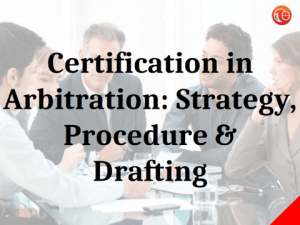This article is written by Neeraj Dubey, pursuing a Certificate Course in Arbitration: Strategy, Procedure and Drafting from Lawsikho.com. Here he discusses “Challenges for Arbitration in India.”
Table of Contents
Introduction
The case titled Giorgio Armani SpA V/s Elan Clothes Co. Ltd., which has been adjudicated by the Hon’ble Hong Kong Court deals with a lot of issues including but not limited to the permanent anti-suit injunction. The case deals with the enforcement of the arbitration agreement upon the non – signatory affiliates of a contracting party. This case illuminates the essentiality of clarification before entering into an agreement with a party who is otherwise engaged in a commercial contract with another party under contract.
The present dispute arises out of the master agreement between the parties namely Giorgio Armani SpA and Elan Clothes Co. Ltd. The prime issue between the parties ascends wherein the Elan Clothes Co. Ltd. Initiated court proceedings in the Shandong courts which violated the terms and conditions of the arbitration clause as agreed upon by the parties in the master agreement. The major issue in the case was determined when the Giorgio Armani (Shanghai) Trading Co. Ltd., Giorgio Armani Hong Kong Ltd., and Giorgio Armani claimed to be bound by the same master agreement entered into by the Giorgio Armani SpA and Elan Clothes Co. Ltd. They claimed to be the associates/affiliated with the Giorgio Armani SpA, hence the arbitration clause shall apply to their dispute as well despite being non – signatory to the master agreement.
Background of the case
Giorgio Armani SpA (hereinafter referred to as ‘the plaintiff’), is part of a group of companies that is an Italian Luxury Fashion House engaged in the business of designing, manufacturing, distributing, and retailing high-end luxury fashion products all across the globe. The Elan Clothes Company Limited (hereinafter referred to as ‘the defendant’), was authorized by the plaintiff to open and operate single-brand stores all across Mainland China to sell clothes and other products of the plaintiff company.
In 2014 the companies entered into a master agreement in Hong Kong for the smooth running of the business. The terms and conditions of the contract were mutually agreed upon by both the parties and the plaintiff had given exclusive rights to the defendant to sell the product of the plaintiff company all across Mainland China. The respondent duly purchased the Armani products from Hong Kong and Shanghai, which are authorised distributors under the master agreement.
In February 2017 the relationship between the parties started to sour when without any prior notice, Giorgio Armani, under the scheme of rebranding, announced in the media that the products of the Armani Jeans and the Armani Collezioni were to be rebranded under the Emporio Armani Brand. It is obvious that this arbitral change on part of the plaintiff, under the garb of rebranding, caused heavy losses to the defendant. The defendant due to the above-mentioned facts and circumstances stopped paying the royalties and the advertising contribution which resulted in the violation of the terms of the master agreement.
Facts of the case/proceedings
On 4th June 2018, the plaintiff served a termination notice to the defendant in order to end the master agreement and conclude the business between the parties. Subsequently, the plaintiff commenced the arbitration proceedings in Hong Kong which were in accordance with the master agreement, seeking a declaration that the plaintiff had legally executed the process to terminate the master agreement between the parties. Further, the plaintiff in the aforesaid arbitration proceedings claimed damages and injunctive relief as well.
The defendant, notwithstanding anything contained in the arbitration clause of the master agreement, initiated separate proceedings in tort in Higher People’s Court in Shandong against the plaintiff. The defendant in its claim invoked the PRC tort law and the Consumer Protection Law. The defendant successfully obtained an order from the Higher People’s Court in Shandong for the preservation of the assets of the plaintiff up to a limit of RMB 600 million. Subsequent to this development, the plaintiff approached the Hong Kong Court and obtained an interim injunction, restraining the defendant from taking any further steps in the proceeding in Higher People’s Court in Shandong. The application filed by the plaintiff praying for 2 requirements in the judgment which were as follows:
- To continue the anti-suit injunction pending final the final disposal of the application praying for permanent injunction;
- To pass the interim order directing the respondent to take all necessary steps to set aside the order of the Shandong’s Court for the preservation of assets.
The respondent in its defense claimed and stated that Hong Kong, Shanghai, and Giorgio Armani are not the parties to the master agreement, therefore, are not bound by the arbitration clause of the master agreement and hence there is no basis for the plaintiffs to restrain the respondent from pursuing the Shandong proceedings against the said plaintiffs.
Arbitration clause between the parties
The master agreement contained the arbitration clause which provided for the laws of Hong Kong to be the governing law in case of any and when any dispute arose between the parties. The arbitration clause in the master agreement is being reiterated for further reference: –
“13.1 Any dispute, controversy or claim deriving from, arising out and/or regarding this Agreement, including any dispute regarding the validity, interpretation, construction, performance, breach, and termination thereof, shall be settled by arbitration in accordance with the UNCITRAL Arbitration Rules as at present in force and as may be amended by the rest of this clause. The appointing authority shall be Hong Kong International Arbitration Centre (HKIAC). The place of arbitration shall be in Hong Kong at Hong Kong International Arbitration Centre. The number of arbitrators shall be three. The arbitrator’s [sic] decision shall be final and binding and may be enforced by any court of competent jurisdiction.
13.2 Nothing in this Article 13 shall be construed as preventing any Party from seeking conservator or other interim relief and remedies, in relation to which the arbitration committee is not competent pursuant to mandatory provisions of law, in any court of competent jurisdiction.”
The present case deals with the concept of the broad aspect of the arbitration clause in an agreement determining the extent to include the non-signatory affiliates of a contracting party. Further, the court has observed the position of the courts of Hong Kong being pro-arbitration in nature especially while dealing in international commercial disputes.
Judgment
- The 1st plaintiff initiated the proceedings of the present case in October 2018. That later by the order dated, 27/02/2019, the Hon’ble Court was pleased to grant the leave and moved other plaintiffs from 2nd Plaintiff to 4th Plaintiff. That the final parties engaged in the said case were Giorgio Armani SpA (1st Plaintiff), Giorgio Armani (Shanghai) Trading Co. Ltd. (2nd Plaintiff), Giorgio Armani Hong Kong Ltd. (3rd Plaintiff), Giorgio Armani (4th Plaintiff), and Elan Clothes Co. Ltd. f/k/a Dalian Les Copious Clothes Co. Ltd. (Defendant).
- On 10/12/2019 the Hon Mimmie Chan J of the Hon’ble High Court of the Hong Kong Special Administrative Region Court of First Instance was pleased to pass the final judgment granting the plaintiff the declaration and permanent injunction sought through the present case before the Hon’ble court.
- In the aforementioned case, the respondent has not disputed the existence and validity of the master agreement which contains the arbitration clause. The Hon’ble Court in its judgment states and clarified the description of the parties in the master agreement as to the Giorgio Armani SpA as a party together with its affiliates. Hence, the parties to the master agreement include Giorgio Armani SpA, Giorgio Armani Shanghai, Giorgio Armani Hong Kong, and Giorgio Armani as parties to the master agreement and are hence bound by the arbitration clause contained in the master agreement.
Further, the court was also pleased to grant the cost of the action to be paid by the respondent to the plaintiff on an indemnity basis including all costs of the proceedings.
Conclusion
It is a well-settled fact that the parties in an arbitration agreement shall opt to resolve their disputes through the arbitration proceedings as the same is efficient and speedy trials that take place at the convenience of the engaged parties. The arbitration proceedings are cost-effective and time-bound which aids to resolve any dispute between the parties involved in the arbitration agreement.
In deciding the above-mentioned case, the Hong Kong court has determined that in circumstances wherein a party to an agreement who has various affiliates and associates should clarify and recognize the parties who have entered into the agreement and illuminate the specifics as to the extent of their involvement in the business. The Hong Kong court in determining the aforementioned case has laid down a precedent concluding that the terms of the arbitration agreement can be extended to include the non-signatory affiliates and associates of the contracting party, hence the anti-suit injunction may be granted against the non–signatory affiliates to the contracting party. The above-mentioned case also clarifies the stand of the Hong Kong courts as pro-arbitration and hence lives up to its respectable and righteous reputation as an international arbitration center.
References
- http://arbitration.site/wp-content/uploads/2019/12/Georgio-case.pdf
- https://www.lexology.com/library/detail.aspx?g=c59fbb01-7abf-4c1f-a76d-2a7c66f21c3c
- https://f.datasrvr.com/fr1/520/51785/Case_summary_-_Giorgio_Armani_SpA_v_Elan_Clothes_Co_Ltd_(No_2).pdf?cbcachex=692559
Students of LawSikho courses regularly produce writing assignments and work on practical exercises as a part of their coursework and develop themselves in real-life practical skills.
LawSikho has created a telegram group for exchanging legal knowledge, referrals, and various opportunities. You can click on this link and join:
 Serato DJ Crack 2025Serato DJ PRO Crack
Serato DJ Crack 2025Serato DJ PRO Crack










 Allow notifications
Allow notifications


